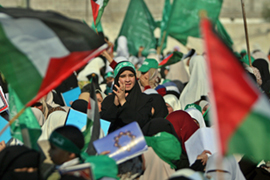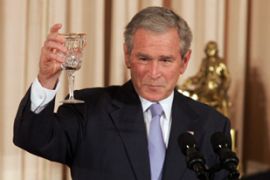Abubakr al-Qirbi, Yemen’s foreign minister, said the talks were unlikely to achieve very much and to be considered a success, they would have to produce some agreement “on initiating the final phase negotiation between the Palestinians and the Israelis”.
‘Nothing meaningful’
He added that there would need to be “very clear objective and a very clear timeframe so that we understand that by the end of this period of negotiations we will achieve the objectives that are set by the Quartet, by the Arab initiative, by President Bush”.
Mark Regev, a spokesman for the Israeli foreign ministry, conceded that it would be “artificial and unrealistic to think you can solve all the issues in a few days”.
Michael Tarazi, a former adviser to the Palestine Liberation Organisation, told Al Jazeera: “It would be a mistake to think that anything meaningful is going to come out of these talks.
“This is a conference where people are going to talk about beginning to talk.
“The real important thing is not what happens at Annapolis, but rather what happens the day after – is there really going to be momentum to address the really thorny issues?”
George Bush, the US president who is hosting the talks, said in a meeting with Ehud Olmert, Israel’s prime minister, that he was “looking forward to continuing our serious dialogue with you and the president of the Palestinian Authority to see whether or not peace is possible”.
He said he was “optimistic” and Olmert echoed that, saying that “this time it’s different” because there were so many participants in the conference.
Arab states such as Syria and Saudi Arabia have agreed to attend the conference.
Bush also met Mahmoud Abbas, the Palestinian president, on Monday, telling him that “the United States cannot impose our vision but we can help facilitate”.
Abbas was also upbeat, saying he had “a great deal of hope” for Tuesday’s talks.
Protests and violence
 |
Hamas denounced the talks and refused to
be bound by any decisions made there [AFP] |
But protests in Jerusalem and Gaza on Monday denouncing any concessions stand in contrast to the positive tone as does the Palestinian and Israeli delegations’ continued inability to produce a joint statement setting out the direction of future peace talks.
In Jerusalem on Monday, thousands of Israelis, many of them settlers in the West Bank, protested against the talks and in support of Jewish settlements in the occupied territories.
Olmert has said no more settlements will be built in the West Bank, but the demonstrators said no territorial concessions in the occupied West Bank and East Jerusalem should be made to the Palestinians.
Gathering at the Western Wall – the holiest site for Jews to pray – they also prayed that the talks would fail.
Al Jazeera’s David Chater, at the scene of protests in Jerusalem, said the demonstrators were the voice of the minority but that voice was loud and could threaten Olmert’s coalition government.
Members from government coalition party Yisrael Beitenu attended the protest, as did Zeev Elkin, a member of Olmert’s Kadima party.
In Gaza, some 2,000 supporters of Hamas, which has not been invited to Annapolis, took to the streets as well.
Ismail Haniya, the Palestinian prime minister whom Abbas fired, joined protesters in saying the president had no right to make concessions.
He expressed “the conviction of the Palestinian people that the Annapolis conference is useless”.
“Consequently, any decisions this conference might reach which affect the rights and principles of the Palestinian people and nation will not be binding for our people. They will be binding only for those who signed them,” Haniya said.
Violence also soured the atmosphere in the Middle East on Monday.
In two incidents, Israeli forces, employing aircraft, tanks and bulldozers, killed four Palestinians in Gaza.
An Israeli army spokesman said the targets were fighters firing mortar shells into Israel.



